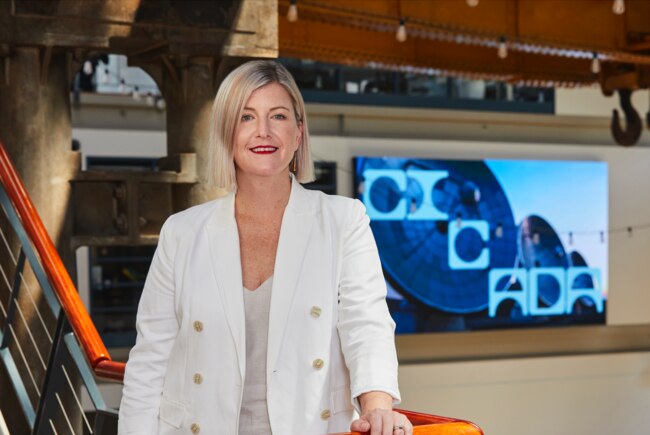Cicada Innovations unveils ‘back to the future’ plan to accelerate tech start-ups to profits
Multinationals operating in Australia need to buy more products and services from tech start-ups here so jobs don’t head to the US, says Cicada Innovations.

The federal government needs to provide incentives for big business to buy more products and services from local tech companies to stop the US “stealing our jobs”, says the boss of deep tech incubator Cicada Innovations.
Cicada chief executive Sally-Ann Williams said companies that scaled up locally were more likely to stay in Australia and sell their wares globally – think CSL – than move to the US to pursue growth.
“If we actually have to get past that early stage, past that sort of one to four employees to 10 to 20 to 30 – and if we actually can build that product here … put the infrastructure in place and if we can connect them to the opportunities to be a scaling business … then they will stay,” Ms Williams said.
“It echoes what they do in Germany, it echoes what they do elsewhere around the world. It’s a bit of a myth to say that the market will take care of deep tech companies and scaling businesses. We actually do have to intervene.”
To this end, Ms Williams, a former Google executive, proposes to borrow elements of Australia’s former carmaking industry, which involved the global makers sourcing many components locally – giving birth to a flourishing second-tier industry – before it hit the brakes mid last decade.
“We need to see a lot more large businesses here, and multinationals that are operating here, collaborating with, procuring from and supporting the development of our small and medium sized businesses,” she said.
“There’s a role for government to support that and promote it, and perhaps look at incentives around it.
“The world’s leading nations and regions are building resilient science-backed economies of the future through integrated policies and systems across government, industry, and academia that catalyse billions in public and private investment into deep tech.”
Such a strategy is vital if Australia wants to move from being predominantly a services-based economy, Ms Williams said. But a new report from Cicada has found the biggest impediment on that switch is a “longstanding deep tech scale-up problem”.
This often means the US effectively “steals” Australian tech jobs, as start-ups move overseas to build scale and pursue profits.
“When Australian deep tech companies are ready to transition from start-up to scale-up, they are being lured offshore in droves – and taking their valuable IP, jobs, contribution to GDP, and future tax revenue with them,” Ms Williams said.
“So we should be looking to programs like the $15bn National Reconstruction which is now investing in Australia’s industrial capabilities, and create a similar, systems-based environment here. This is the only way to stem this exodus of Australia’s most promising value-creating deep tech companies.”
But “short-termism” and the unrealistic expectation of generating quick profits has created another roadblock in creating the next CSL or Cochlear, both of which are headquartered in Australia but have global operations, Ms Williams said.
“In the biotech sector and medtech sector, we’ve had a lot of investment over the years, increasingly in early stage research and we’ve seen a few companies starting to come through the works in devices but also in the therapeutic space. But they do take 20 to 30 to 40 years. Cochlear is not an overnight success story. It’s a 40-plus year success story.
“I’m the first to say I would not put up my hands to be a politician. Having to think in short-term cycles goes exactly against … what we actually really need for the long term in this country.”
Ms Williams highlighted the US’s Small Business Innovation funding program, which was established in 1982.
“That’s been going for over 40 years. It’s one of the major funders of small business in America and pulling it through to market because it actually guarantees them a pathway to procurement, or certainly de-risks that pathway, to procurement, which means you’re increasing the capability of those businesses over time,” she said.
“The spillover effects are more jobs, they’re high value jobs. You de-risk that company, not just for an American customer, but also for an international customer.”
Cicada is a 23-year-old business that offers custom labs and offices for deep tech start-ups as well as mentoring and investment programs.
It’s found that of the 128 deep tech companies that applied for Cicada x Tech23 festival – a showcase “celebrating radical innovation and brave ideas” – only 11 per cent were spun out of universities or research institutes.
“Ninety of them were independently founded,” Ms Williams said. “I don’t think that that’s a problem, but it just means that we’re maybe not focused on where are these companies emerging from and what are they doing”.




To join the conversation, please log in. Don't have an account? Register
Join the conversation, you are commenting as Logout